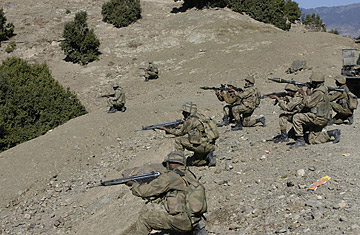
Pakistani army troops take positions near a Taliban stronghold in Kot Kai, in a tribal area of Waziristan, along the Afghanistan border, on Nov. 26, 2009
The Pakistani generals and politicians watching President Obama's West Point address applauded his sensitive tone and offers of additional support for their counterinsurgency efforts and fledgling democracy. But Obama's plan to dispatch 30,000 extra troops to the war next door has been greeted with ambivalence. While Obama's setting a date for the beginning of a withdrawal was welcomed, the element of the new strategy that has Pakistan's military sensing a long-awaited opportunity is the prospect of negotiations with the Taliban.
The government in Islamabad greeted Obama's speech with "cautious optimism." But, warned presidential spokesman Farahnaz Ispahani, if the U.S. and NATO fail to eliminate militancy within Afghanistan "speedily and in consultation with Pakistan, there is a fear of a spillover effect." The same concern colors the thinking of the military establishment, which will be making the decisions that matter on the Pakistani side. "The army is caught in a conundrum," says Shuja Nawaz, director of the South Asia Center at the Atlantic Council. "It doesn't want the U.S. to leave in a precipitous manner, but it also concerned that by having more troops in Afghanistan, militants may be pushed into Pakistan." Other observers believe that the effects of any such spillover would be manageable. "The troops will be mainly in the south," says former Interior Minister Aftab Sherpao. "I don't see much cross-border movement happening there."
Pakistan's generals don't want a hasty U.S. withdrawal, which Nawaz warns would mean "chaos, which is not to anyone's benefit." But they welcomed the exit date cited by Obama in his speech because they do want the U.S. to leave — in an orderly fashion, over time and in the context of negotiations with the Taliban. Given its longtime relationship with the Taliban leadership, which is generally believed to be based in the Pakistani city of Quetta, Pakistan's military establishment hopes to position itself as the mediator in talks that they believe are inevitable.
"Under the circumstances, Obama has made the best of a bad bargain," says prominent opposition politician Mushahid Hussain. "He has lowered his sights and limited his goals. Victory is no longer possible; there will not be nation-building. There is pressure to come to the negotiating table. The Pakistan army will feel comfortable in an arrangement where they are partnering with the Americans on negotiations."
Contrary to the American conventional wisdom that sees the U.S. mission in Afghanistan as central to Pakistan's security, Pakistani generals see a U.S. departure as key to stabilizing their country. "What is happening on this side of the border will die down once the American troops begin to withdraw," says Sherpao, echoing a widely held Pakistani assumption. "The extra troops will apply pressure on the Taliban, but then a parallel process would also start. By the time they start leaving, a consensus will begin to be formed on the future of Afghanistan."
The Pakistani army sees the conflict in Afghanistan being resolved through negotiations that lead toward the establishment of a new government with greater Pashtun representation and diminished Indian influence. Pakistan's security establishment has never embraced Afghan President Hamid Karzai's government, which it sees as dominated by the ethnic Tajik, Uzbek and Hazara forces of the India-backed Northern Alliance. And it fears that India is expanding its influence there through massive development projects, even accusing India of using Afghanistan as a base from which to destabilize Pakistan.
"Pakistan's aim has always been to have a friendly government in Kabul that is an accurate representation of the Pashtun population," says Nawaz. "If there's a reconfiguration of the Karzai government, it brings more Pashtuns in, Pakistan may want to play a part to try and bring in people that may be supporting the Taliban but are not ideologues." Such a solution would probably not involve Mullah Omar and the Afghan Taliban directly but would perhaps include the notorious Haqqani network based in Pakistan's North Waziristan and Gulbuddin Hekmatyar, leader of Hizb-e-Islami — both of which have enjoyed extensive contacts with Pakistan's Inter-Services Intelligence agency.
But this is where Washington and Islamabad's interests collide. The U.S. has warned Pakistani President Asif Ali Zardari that it expects Pakistani security forces to take action against the Afghan Taliban as well as the Haqqani network and Hizb-e-Islami, but Pakistan is loath to act against militants on its territory who confine their operations to Afghanistan, focusing instead on those extremists who directly challenge the Pakistani state. An unpopular and politically beleaguered Zardari is in no position to help Obama.
Pakistani military officials say limited resources force them to prioritize going after the Pakistani Taliban, while leaving militant groups focused on Afghanistan largely unmolested. But observers say that, in fact, the Pakistani military views the Afghan Taliban leadership and groups such as Hekmatyar's Hizb-e-Islami and the Haqqanis as a means of securing its interests in Afghanistan. "It's leverage in the sense that it allows them to have a government in Kabul that is neutral, if not pro-Pakistan," says Nawaz. "That's why they've always hedged on the Afghan Taliban."
Relations between Pakistan and the Obama Administration could be sharply strained if Washington decides to expand its covert air strikes on Pakistani soil. In recent years, Pakistani officials have publicly protested but privately acquiesced when CIA-operated drone strikes have targeted al-Qaeda and Taliban militants in the mountainous tribal areas — a program that has eliminated more than a dozen senior al-Qaeda operatives and even Baitullah Mehsud, the founding leader of the Pakistani Taliban. But the perceived violation of sovereignty has also enraged the Pakistani public. If the U.S. decides to expand the target range of such strikes beyond the tribal areas to go after the Afghan Taliban leadership in Quetta, that shift would be intolerable for the Pakistani leadership.
